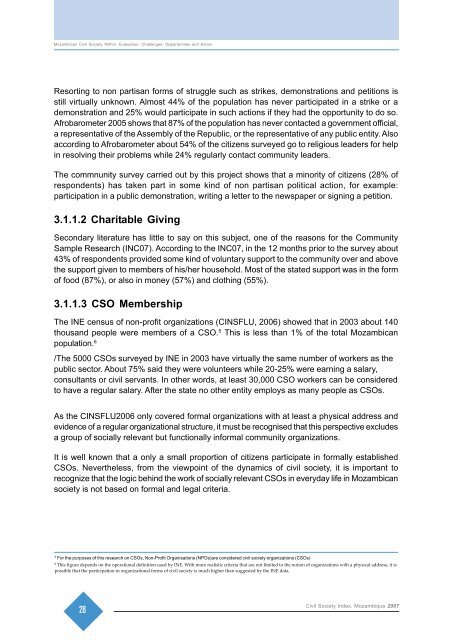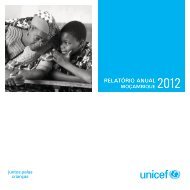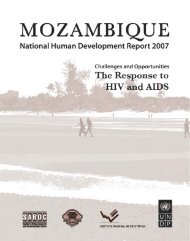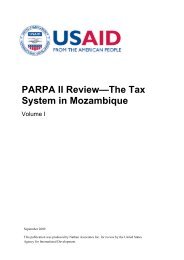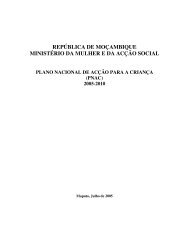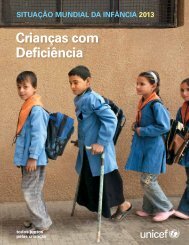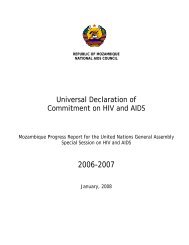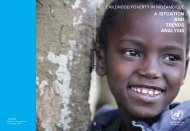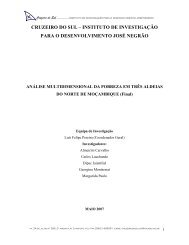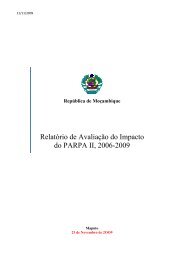Mozambican Civil Society Within: - UNICEF Mozambique - Home page
Mozambican Civil Society Within: - UNICEF Mozambique - Home page
Mozambican Civil Society Within: - UNICEF Mozambique - Home page
Create successful ePaper yourself
Turn your PDF publications into a flip-book with our unique Google optimized e-Paper software.
<strong>Mozambican</strong> <strong>Civil</strong> <strong>Society</strong> <strong>Within</strong>: Evaluation, Challenges, Opportunities and Action<br />
Resorting to non partisan forms of struggle such as strikes, demonstrations and petitions is<br />
still virtually unknown. Almost 44% of the population has never participated in a strike or a<br />
demonstration and 25% would participate in such actions if they had the opportunity to do so.<br />
Afrobarometer 2005 shows that 87% of the population has never contacted a government official,<br />
a representative of the Assembly of the Republic, or the representative of any public entity. Also<br />
according to Afrobarometer about 54% of the citizens surveyed go to religious leaders for help<br />
in resolving their problems while 24% regularly contact community leaders.<br />
The commnunity survey carried out by this project shows that a minority of citizens (28% of<br />
respondents) has taken part in some kind of non partisan political action, for example:<br />
participation in a public demonstration, writing a letter to the newspaper or signing a petition.<br />
3.1.1.2 Charitable Giving<br />
Secondary literature has little to say on this subject, one of the reasons for the Community<br />
Sample Research (INC07). According to the INC07, in the 12 months prior to the survey about<br />
43% of respondents provided some kind of voluntary support to the community over and above<br />
the support given to members of his/her household. Most of the stated support was in the form<br />
of food (87%), or also in money (57%) and clothing (55%).<br />
3.1.1.3 CSO Membership<br />
The INE census of non-profit organizations (CINSFLU, 2006) showed that in 2003 about 140<br />
thousand people were members of a CSO. 5 This is less than 1% of the total <strong>Mozambican</strong><br />
population. 6<br />
/The 5000 CSOs surveyed by INE in 2003 have virtually the same number of workers as the<br />
public sector. About 75% said they were volunteers while 20-25% were earning a salary,<br />
consultants or civil servants. In other words, at least 30,000 CSO workers can be considered<br />
to have a regular salary. After the state no other entity employs as many people as CSOs.<br />
As the CINSFLU2006 only covered formal organizations with at least a physical address and<br />
evidence of a regular organizational structure, it must be recognised that this perspective excludes<br />
a group of socially relevant but functionally informal community organizations.<br />
It is well known that a only a small proportion of citizens participate in formally established<br />
CSOs. Nevertheless, from the viewpoint of the dynamics of civil society, it is important to<br />
recognize that the logic behind the work of socially relevant CSOs in everyday life in <strong>Mozambican</strong><br />
society is not based on formal and legal criteria.<br />
5<br />
For the purposes of this research on CSOs, Non-Profit Organisations (NPOs)are considered civil society organizations (CSOs)<br />
6<br />
This figure depends on the operational definition used by INE. With more realistic criteria that are not limited to the notion of organizations with a physical address, it is<br />
possible that the participation in organizational forms of civil society is much higher than suggested by the INE data.<br />
28<br />
<strong>Civil</strong> <strong>Society</strong> Index, <strong>Mozambique</strong> 2007


